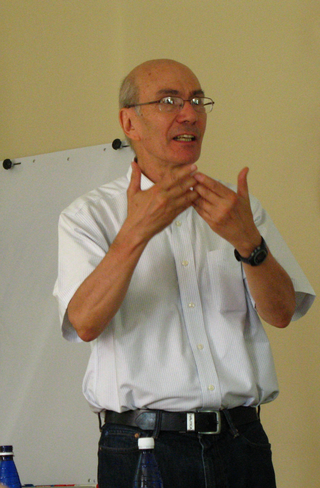Related Research Articles

The mind is what thinks, feels, perceives, imagines, remembers, and wills, encompassing the totality of mental phenomena. It includes both conscious processes, through which an individual is aware of external and internal circumstances, and unconscious processes, which can influence an individual without intention or awareness. Traditionally, minds were often conceived as separate entities that can exist on their own but are more commonly understood as features or capacities of other entities in the contemporary discourse. The mind plays a central role in most aspects of human life but its exact nature is disputed; some theorists suggest that all mental phenomena are private and directly knowable, transform information, have the ability to refer to and represent other entities, or are dispositions to engage in behavior.

The philosophy of perception is concerned with the nature of perceptual experience and the status of perceptual data, in particular how they relate to beliefs about, or knowledge of, the world. Any explicit account of perception requires a commitment to one of a variety of ontological or metaphysical views. Philosophers distinguish internalist accounts, which assume that perceptions of objects, and knowledge or beliefs about them, are aspects of an individual's mind, and externalist accounts, which state that they constitute real aspects of the world external to the individual. The position of naïve realism—the 'everyday' impression of physical objects constituting what is perceived—is to some extent contradicted by the occurrence of perceptual illusions and hallucinations and the relativity of perceptual experience as well as certain insights in science. Realist conceptions include phenomenalism and direct and indirect realism. Anti-realist conceptions include idealism and skepticism. Recent philosophical work have expanded on the philosophical features of perception by going beyond the single paradigm of vision.

Owen Flanagan is the James B. Duke University Professor Emeritus of Philosophy and Professor of Neurobiology Emeritus at Duke University. Flanagan has done work in philosophy of mind, philosophy of psychology, philosophy of social science, ethics, contemporary ethical theory, moral psychology, as well as on cross-cultural philosophy.

John Henry McDowell is a South African philosopher, formerly a fellow of University College, Oxford, and now university professor at the University of Pittsburgh. Although he has written on metaphysics, epistemology, ancient philosophy, nature, and meta-ethics, McDowell's most influential work has been in the philosophy of mind and philosophy of language. McDowell was one of three recipients of the 2010 Andrew W. Mellon Foundation's Distinguished Achievement Award, and is a Fellow of both the American Academy of Arts & Sciences and the British Academy.
Eliminative materialism is a materialist position in the philosophy of mind. It is the idea that the majority of mental states in folk psychology do not exist. Some supporters of eliminativism argue that no coherent neural basis will be found for many everyday psychological concepts such as belief or desire, since they are poorly defined. The argument is that psychological concepts of behavior and experience should be judged by how well they reduce to the biological level. Other versions entail the nonexistence of conscious mental states such as pain and visual perceptions.
Colin McGinn is a British philosopher. He has held teaching posts and professorships at University College London, the University of Oxford, Rutgers University, and the University of Miami.

Ned Joel Block is an American philosopher working in philosophy of mind who has made important contributions to the understanding of consciousness and the philosophy of cognitive science. He has been professor of philosophy and psychology at New York University since 1996.
Christopher Arthur Bruce Peacocke is a British philosopher known for his work in philosophy of mind and epistemology. His recent publications, in the field of epistemology, have defended a version of rationalism. His daughter, Antonia Peacocke, is also a philosopher, now at Stanford University, specialising in philosophy of mind.

John Campbell is Willis S. and Marion Slusser Professor of Philosophy at the University of California in Berkeley, California. He works primarily in philosophy of mind.

Gregory Paul Currie FAHA is a British philosopher and academic, known for his work on philosophical aesthetics and the philosophy of mind. Currie is Professor of Philosophy at the University of York and Executive Editor of Mind & Language.

Stephen P. Stich is an American academic who is Distinguished Professor of Philosophy and Cognitive Science at Rutgers University, as well as an Honorary Professor in Philosophy at the University of Sheffield. Stich's main philosophical interests are in the philosophy of mind, epistemology, and moral psychology. His 1983 book, From Folk Psychology to Cognitive Science: The Case Against Belief, received much attention as he argued for a form of eliminative materialism about the mind. He changed his mind, in later years, as indicated in his 1996 book Deconstructing the Mind.
Tyler Burge is an American philosopher who is a Distinguished Professor of Philosophy at UCLA. Burge has made contributions to many areas of philosophy, including the philosophy of mind, philosophy of logic, epistemology, philosophy of language, and the history of philosophy.

Christopher Donald Frith FRS, FMedSci, FBA, FAAAS is a British psychologist and professor emeritus at the Wellcome Centre for Neuroimaging at University College London. He is also an affiliated research worker at the Interacting Minds Centre at Aarhus University, an honorary Research Fellow at the Institute of Philosophy and a Quondam Fellow of All Souls College, Oxford.
The Philosophy of mind is a branch of philosophy that deals with the nature of the mind and its relation to the body and the external world.

Peter Carruthers is a British-American philosopher and cognitive scientist working primarily in the area of philosophy of mind, though he has also made contributions to philosophy of language and ethics. He is a professor of philosophy at the University of Maryland, College Park, an associate member of Neuroscience and Cognitive Science Program, and a member of the Committee for Philosophy and the Sciences.

Alva Noë is an American philosopher. He is Professor of Philosophy at the University of California, Berkeley. The focus of his work is the theory of perception and consciousness. In addition to these problems in cognitive science and the philosophy of mind, he is interested in analytic phenomenology, the theory of art, Ludwig Wittgenstein, enactivism, and the origins of analytic philosophy.
Externalism is a group of positions in the philosophy of mind which argues that the conscious mind is not only the result of what is going on inside the nervous system, but also what occurs or exists outside the subject. It is contrasted with internalism which holds that the mind emerges from neural activity alone. Externalism is a belief that the mind is not just the brain or functions of the brain.
David Richard Olson is a Canadian cognitive developmental psychologist who has studied the development of language, literacy, and cognition, particularly the mental lives of children, their understanding of language and mind and the psychology of teaching. Olson is University Professor Emeritus at the Ontario Institute for Studies in Education at the University of Toronto, where he has taught since 1966.
Andrew Brook is a Canadian philosopher, author and academic particularly known for his writings on Immanuel Kant and the interplay between philosophy and cognitive science. Brook is Chancellor's Professor Emeritus of Philosophy and Cognitive Science at Carleton University, former President of the Canadian Psychoanalytic Society, and former President of the Canadian Philosophical Association.

Robert D. Rupert is an American philosopher. His primary academic appointment is at the University of Colorado at Boulder (UCB), where he is Professor of Philosophy, a fellow of UCB's Institute of Cognitive Science, and a member of UCB's Committee on the History and Philosophy of Science. He is Regular Visiting professor at the University of Edinburgh’s Eidyn Centre and is the co-editor in chief of the British Journal for the Philosophy of Science.
References
- ↑ "Prof Martin Davies - Faculty of Philosophy". Philosophy.ox.ac.uk. 4 July 2012. Archived from the original on 11 April 2016. Retrieved 22 April 2016.
- ↑ Biography – Martin Davies
- ↑ "Martin Davies". www.mkdavies.net. Archived from the original on 2 March 2015.
- ↑ "Martin Davies, Ph.D. | Nour Foundation".